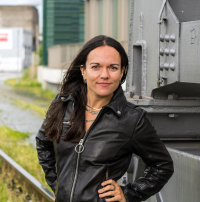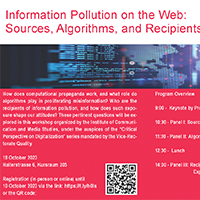Events on critical perspectives on digitalization
Organization of lectures, workshops etc.
Lectures, conferences and workshops are offered on an alternating basis as part of the “Critical perspectives on digitalization” event series. The series sees itself as a format for reflection that promotes a critical approach to digitalization. Critical perspectives reveal assumptions about digitalization and examine the extent to which technology, science and society are interwoven. Power relations based on this interconnectedness are uncovered through critical perspectives on digitalization; at the same time, the aim is to shape the fairer use of technologies through inter- and transdisciplinary collaboration.
As a process-oriented platform for exchange and reflection, the event is intended to promote dialog between specialist disciplines, faculties, specialist units and others.
The responsible working group of the Vice-Rectorate Quality and Sustainable Development alternately approaches faculties, university centers and other units of the University that are hosting the event.
The series of events is supported by the Digitization Commission of the University of Bern (DigK).
Project management
Prof. Dr. Heike Mayer, Vice-Rectorate Quality and Sustainable Development, heike.mayer@unibe.ch
Dr. Claudia Saalfrank, Vice-Rectorate Quality and Sustainable Development, claudia.saalfrank@unibe.ch
Upcoming events
Past events
01.11.2024 - Workshop

#13 Workshop with Amrei Bahr - Protecting digital autonomy: What is needed in research and teaching?
Digital autonomy is a precious asset, but it is increasingly at risk in the scientific community – especially through the use of AI tools, which threatens to be accompanied by various, sometimes irreversible dependencies. What can be done to protect research and teaching from these dependencies? We will discuss this at the workshop – and also talk about comparable dependencies such as those within the scientific publication system.
31.10.2024 - Event

#12 On large publishers, AI corporations and the perils of third-party funding: how science is chaining itself
Science is free - one might think at first glance, and that would certainly be desirable. In fact, however, science has repeatedly found itself in problematic dependencies in recent decades. These include dependence on large publishers, which the open access movement is only partially able to resolve, dependence on third-party funding for research as well as reputation, and, more recently, an increasing dependence on commercial AI tools. The keynote address will explore these dependencies and show how they can be broken.
18.09.2024 - Event

#11 Digitized Research and Its Costs: Discussing Sustainable Development
How can large digital (research) infrastructures, such as the Alps supercomputer, be harmonised with sustainability goals? A lively discussion with invited experts from the Swiss research world will examine the social, ecological and economic costs of research.
18.10.2023 - Workshop

#10 Information Pollution on the Web: Sources, Algorithms, and Recipients
How does computational propaganda work, and what role do algorithms play in proliferating misinformation? Who are the recipients of information pollution, and how does such exposure shape our attitudes? These pertinent questions will be explored in this workshop organized by the Institute of Communication and Media Studies, under the auspices of the “Critical Perspective on Digitalization” series mandated by the Vice-Rectorate Quality.
21.04.2023 - Tagung
#9 Interaktive Sprachmodelle: Lehre und Forschung mit ChatGPT & Co
Die Verwendung von interaktiven Sprachmodellen in Hochschulen und Bildungseinrichtungen wird immer wichtiger, aber zunehmend kontroverser diskutiert. Ein Verbot dieser Technologie ist nicht zweckmässig und schränkt die Kreativität ein. Stattdessen sollten wir die neuen Möglichkeiten ausloten und gemeinsam über die besten Anwendungen in Lehre und Forschung diskutieren. Diese Tagung bietet eine hervorragende Gelegenheit, sich mit Fachpersonen und Praktiker:innen auszutauschen, die kritisch und kreativ die interaktiven Sprachmodelle in ihre Lehre und Forschung integriert haben.
16.11.2023 - Podiumsdiskussion
#8 Stop Hate Speech! Aber wie?
Wenn sich Forschende in der Öffentlichkeit exponieren, sind sie teilweise gehässigen Reaktionen ausgesetzt. Die Universität Bern stellt ihren Mitarbeitenden deshalb ab sofort verschiedene Angebote zur Verfügung, unter anderem die Netz-Ambulanz, die in Notfällen bereitsteht.
31.10.2022 - Konferenz
#7 Biased Data, Models, and Algorithms. Perspectives from Data Science
Data Science and especially machine learning technologies require massive amounts of data in order to produce stable and reliable models. At the same time, researchers and public advocates pointed for several years to problems embedded in data: Be it as unbalanced data sets and highly problematic representations of culture or society. The event brings together critical approaches and high-end data science applications. We want to discuss how we can cope with the challenges of data-hungry algorithms in a society aware of collection and representation shortcomings.
23.05.2022 - Workshop
#6 Zukunftsideale und Technologiemythen
Das Ziel der Veranstaltung ist es einerseits, ‹sociotechnical imaginaries› und ihre Wirksamkeit anhand bestimmter Fallbeispiele zu verstehen, und andererseits nach den konkreten Legitimierungspraktiken und -mechanismen zu fragen, welche Digitalisierungsprozesse und Ausgrenzungen stabilisieren. Teilnehmende sind eingeladen, sich während dieser Veranstaltung mit ihrem eigenen Forschungsmaterial aus der Perspektive der ‹sociotechnical imaginaries› in Gruppen und im Plenum auseinanderzusetzen.
01.12.2021 - Workshop
#5 Digitalisierung - totalitär?
Die zunehmende Nutzung digitaler Technologien zur Überwachung und Normierung menschlichen Verhaltens geht mit sozialgesellschaftlichen Veränderungen der globalen Welt einher, die inzwischen kaum bestreitbar auch totalitäre Tendenzen aufweisen können. Ein Blick auf das chinesische Sozialkreditsystem oder etwa das Aufkommen von "Pre-Crime"-Überwachungstechnologien genügt. Es stellt sich für unsere heutige Zeit die kritische Frage, ob und inwiefern es angebracht ist, Digitalisierung als totalitär zu begreifen und falls ja, welche Bedeutung dabei der Bezeichnung "totalitär" beigelegt wird.
18.10.2021 - Online-Workshop
#4 New frontiers of digital inequality
Digitalization is considered to open up many opportunities for greater sustainability and is generally seen as having an impact on a sustainable future, with the effects being assessed as both positive and negative. A keynote by Dr. Jamie Woodcock and case studies of projects with a digitalization focus from CDE will provide insight into ongoing research. In a panel discussion with speakers, additional guests as well as the audience, solutions for minimizing digital inequalities will be discussed.
26.05.2021 - Online-Konferenz
#3 Data Colonialism and a Path Towards Data Sovereignty and Digital Sustainability
The online conference «Data Colonialism and a Path Towards Data Sovereignty and Digital Sustainability» on Wednesday, 26 May 2021 addresses the challenge that much of today's data and digital infrastructure is controlled by the private tech industry leading to the new threat of «data colonialism».
25.11.2020 - Online-Konferenz
#2 Open Access - mehr Partizipation oder neue Ungleichheiten?
Open Access steht für die kostenlose Verbreitung von Forschungsergebnissen und die uneingeschränkte Partizipation am wissenschaftlichen Wissen. In der Praxis läuft Open Access jedoch auch Gefahr, bestehende Ungleichheiten zu verfestigen oder neue zu erzeugen. Das Vizerektorat Qualität und die Universitätsbibliothek Bern laden zu einer Diskussion über die emanzipativen Potentiale und Risiken von Programmen zur Umsetzung von Open Access ein.
29.11.2019 - Workshop
#1 Digitale Transformation und Geschlecht
Zur ersten Veranstaltung am 29. November 2019 lud das Interdisziplinäre Zentrum für Geschlechterforschung (IZFG) zusammen mit der Informatikerin und Geschlechterforscherin Prof. Dr.-Ing. Corinna Bath (TU Braunschweig) ein. Die Veranstaltung wurde von Claudia Amsler (IZFG) geleitet und von den beiden Kulturschaffenden Levent Pinarci und Tanja Schwarz künstlerisch dokumentiert.
